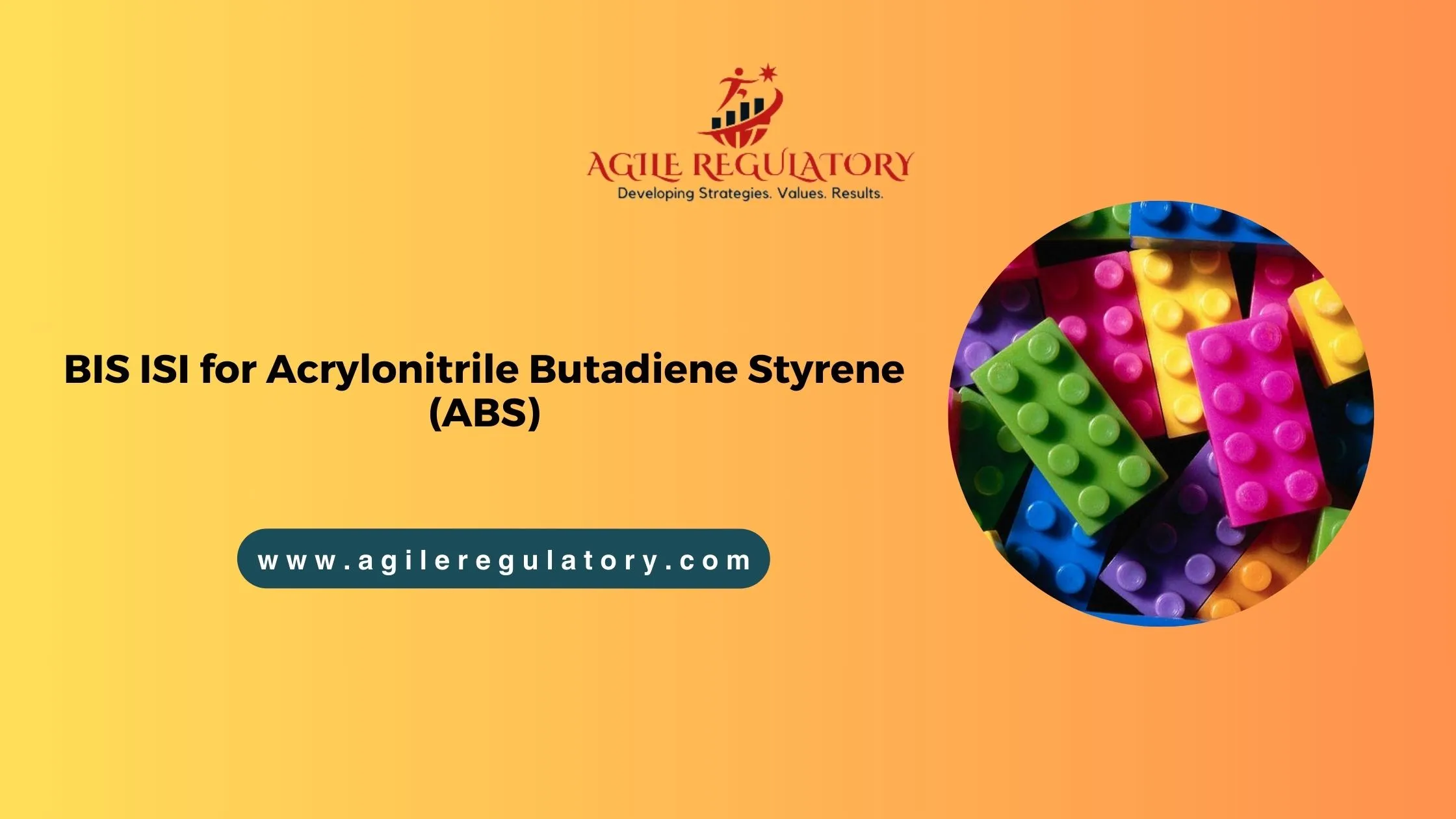
Get Instant Solution By an Expert Advisor
(4.8)


ABS (Acrylonitrile Butadiene Styrene) is a versatile and widely used thermoplastic polymer known for its strong mechanical properties, durability, heat and chemical resistance. The BIS created the standard in 2019, which conforms with the worldwide standard ISO 19062-1:2015 to assure the quality and safety of ABS materials accessible in the Indian market. In this blog post will explore the registration process, documents required, importance of BIS certification for ABS in India.
The Bureau of Indian Standards (BIS) is an Indian government agency responsible for defining and implementing product standards to ensure product quality and safety. BIS certification is a quality mark that validates that a product meets the fundamental safety and performance criteria and follows the Indian Standard (IS). In the case of ABS materials, IS 17077:2019 is the standard to be met, which aligns with ISO 19062-1:2015.
IS 17077:2019/ISO 19062-1:2015 specifies the requirements for ABS and its various properties, including:
The standard outlines the composition and chemical properties of ABS, which includes the percentage of acrylonitrile, butadiene, and styrene. This is important as ABS formulations are suited for different applications.
ABS is widely used for its mechanical strength and impact resistance. Tbe BIS standard defines the requirements for tensile strength, elongation, and impact strength to ensure the material's durability.
ABS must withstand various temperature conditions. The BIS standard provides guidelines for heat deflection temperature and the coefficient of linear thermal expansion.
ABS materials should meet specified flammability requirements to ensure safety in various applications.
Applicable BIS standard also check the properties related to dimensional stability, color, and surface finish, which are important in many ABS applications, including consumer goods and automotive parts.
Manufacturers seeking ISI mark certification for their Acrylonitrile - Butadiene Styrene (ABS) must undergo a rigorous testing and inspection process. This typically includes the following steps:
Identify the applicable Indian Standard (IS) for ABS materials. In the case of ABS, it is IS 17077:2019. Make sure your ABS product meets the requirements outlined in this standard.
A manufacturer or importer of ABS (Acrylonitrile Butadiene Styrene) needs to prepare the necessary documents:
Provide detailed information about your manufacturing facility, including its location, contact details and infrastructure.
Submit detailed product specifications, including composition, mechanical properties, thermal properties, flammability and other relevant information as per IS 17077:2019.
Describe your quality control and testing processes to ensure compliance with the standard.
Your ABS materials will need to undergo testing in a BIS-approved laboratory to ensure they meet the requirements of IS 17077:2019. The BIS or a BIS-approved lab will conduct these tests.
Implement a quality management system in your manufacturing facility to ensure consistent quality of ABS materials.
Visit the BIS website and create an account for the BIS online portal to initiate the BIS registration process. Fill out the required application forms for obtaining the ISI Mark.
Upload all the necessary documents, including the manufacturer's details, product specifications, and evidence of your quality management system.
Pay the requisite fees for application processing and testing. The fees totally depend on the type of products and their testing requirements.
BIS may conduct an on-site inspection of your manufacturing plant to ensure that your quality control and production procedures meet requirements.
Send samples of your ABS materials to a BIS-approved laboratory for testing according to IS 17077:2019. Ensure the samples are representative of your production and meet the specified criteria.
The BIS approved laboratory will evaluate the ABS samples and submit their test reports to BIS.
BIS will review the application, documentation, test reports, and the results of the factory inspection. If everything is in compliance with the standard, and the quality is assured, BIS will issue the ISI Mark Certificate.
Once your application is approved, you will be issued the ISI Mark for your ABS materials, allowing you to use the mark on your products.
After certification, BIS may conduct periodic surveillance to ensure that your ABS materials continue to meet the standards and adhere to the quality management system.
BIS certification ensures that ABS materials meet the required standards, resulting in high-quality products that perform as expected.
With BIS certification, consumers can trust that the ABS products they purchase are safe and meet the necessary quality standards.
BIS certification is often a regulatory requirement in India for specific products.
Global Acceptance: ISO standards are recognized globally, making BIS-certified ABS materials more accessible to international markets, and contributing to export opportunities for Indian manufacturers.
BIS Certification for Acrylonitrile - Butadiene Styrene (ABS) materials as per IS 17077:2019/ISO 19062-1:2015 plays a major role in ensuring the quality and safety of these materials in India. BIS certification for ABS is beneficial for both manufacturers and consumers as it offers high-quality ABS goods that meet Indian Standard specifications.
#checkout a detailed process: BIS CERTIFICATE

 Vanshika Mathur
Vanshika Mathur
12 Feb, 2026

 Divya Saxena
Divya Saxena
12 Feb, 2026

 Nishi Chawla
Nishi Chawla
12 Feb, 2026

 Nishi Chawla
Nishi Chawla
12 Feb, 2026

 Vanshika Mathur
Vanshika Mathur
11 Feb, 2026

Get Instant Solution By an Expert Advisor
(4.8)
We simplify compliance through a proven 4-step process: Consultation, Documentation, Submission, and certification. From understanding requirements to getting final approvals, we deliver a smooth, timely, and fully compliant journey for your business.
What our customer says about us
Fantastic support from the team. Their expertise transformed our approach, driving remarkable outcomes. A must-have partner for businesses seeking effective consulting solutions. Highly recommended.

KTPL Instruments
Agile Regualtory delivers exceptional solutions. Their insightful guidance streamlined our processes and boosted profitability. Highly recommended for businesses seeking expert consulting services to thrive.

Justrack IOT
Impressed by Agile Regulatory's expertise. Their strategic insights and practical solutions have elevated our business operations. A reliable partner for effective consulting services. Highly recommended for growth-focused businesses.

Coaire Compressor
Extraordinary consulting services. Their insightful solutions and dedicated team reshaped our business, driving remarkable improvements. Highly recommend it for transformative results.

Easy Polymer
Incredible experience with Agile Regulatory. Their innovative strategies and expert advice revitalized our business model, resulting in impressive growth. Highly recommend their exceptional consulting services.

Tarus International
Top-tier consulting! offered strategic solutions that revolutionized our approach. Their deep expertise and personalized guidance made a significant impact on our success. Highly recommend their services.

Anchor Weighing
Agile Regulatory exceeded expectations! Their tailored solutions, expertise, and proactive approach led to remarkable results. Highly recommend for businesses seeking impactful and strategic guidance.

AM Capacitor
Outstanding service! delivered targeted solutions with professionalism and expertise. Their insights elevated our business strategies, resulting in noticeable growth. Highly recommended for exceptional consultation.

Imaxx Pro Aquistic
Leave a Reply
Your email address will not be published. Required fields are marked *